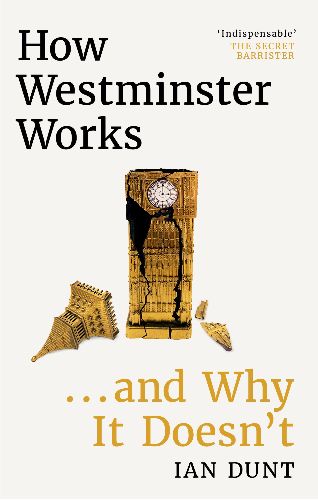As with a number of recent publications on the political and constitutional arrangements of the UK, Ian Dunt attempts to take a complicated and ill-understood topic and make it digestible for all audiences. His thorough research is evidenced with a short glance at the acknowledgements section, which presents a snapshot of the great and the good of Westminster, academia and politics.
He has structured his case as a logical journey through the different aspects and institutions which form the ‘Westminster bubble’, making the content more accessible but also, practically, allowing the reader to pick and choose – if they wish – the areas of most interest to them.
What Dunt has produced is a critical analysis of a Westminster system which is long overdue for review whilst directing readers away from the commonplace argument that its failings are a result only of laziness or corruption. Reading as a former civil servant, there were moments throughout when I had to remind myself not to take comments personally as the overarching narrative is weighted towards the ‘why it doesn’t’ more than the ‘how it works’.

I found myself agreeing with many of the challenges Dunt posed throughout – the pressures on ministers, the organisation of the civil service, and financial pressures to name but a few. However, at times greater counterbalance would have made some of his challenges appear less pointed. The approach is broad-brush and could have used a little more acknowledgement of the parts of the UK system that do stand up to scrutiny and the risks that alternative options also carry, as Dunt fleetingly acknowledges in the epilogue.
Dunt does a good job of drawing attention to parts of the Westminster machinery that operate behind the veil but which perform crucial functions day in and day out. Of particular interest to me were his explanations of ‘the usual channels’ (a term used to describe methods of cooperation between government and opposition whips), the Parliamentary Business and Legislation Committee, who oversee and clear all government legislation, and the committee’s supporting officials, who play a crucial role in providing advice on these tricky and political issues.
Whether these systems are themselves the best way to conduct business is a matter of opinion, but the point Dunt raises is that key processes remain opaque, even amongst parliamentarians, and in many cases, this needs to be rectified. He also uses his discussion of the PBL, in particular, to explore the challenge of how to build and recognise expertise within government.
Dunt speaks positively of two parts of the system in particular – select committees and the House of Lords. Whilst I wasn’t entirely convinced by his conclusions about the extent to which the former are free from political interference, I was pleasantly surprised to find him speaking up for the latter.
Once again, the political class have been sharpening their pitchforks on the issue of Lords reform, so it was encouraging to see support for their scrutinising role while still addressing the issues with its existing constitution.
More of this ‘pros and cons’ style of analysis throughout would have provided a more balanced account, though it may also have stunted the message that the author is seeking to deliver – shock to action rather than academic tome.
In writing this book, Dunt has succeeded in producing a catalyst for discussion around an often ignored or misunderstood issue, which is crying out for attention. Aside from the specificities of the contents, getting his audience thinking about how our system works and what they would like to see change feels positive in any light. The million-dollar question – considered but not answered in these pages – remains how to persuade the politically ambitious that constitutional change is a necessity, not a nice to have.
Samuel Chivers is senior consultant at Stonehaven specialising in UK governance and decision making. He spent most of his career as a civil servant in central government including working on Covid procurement